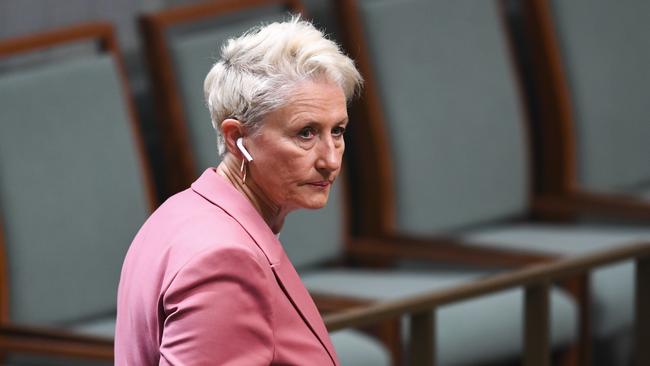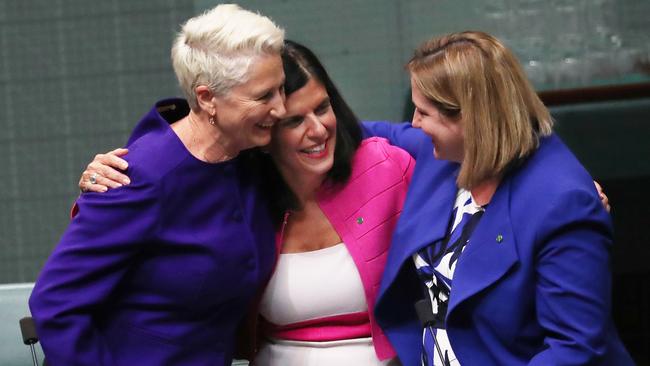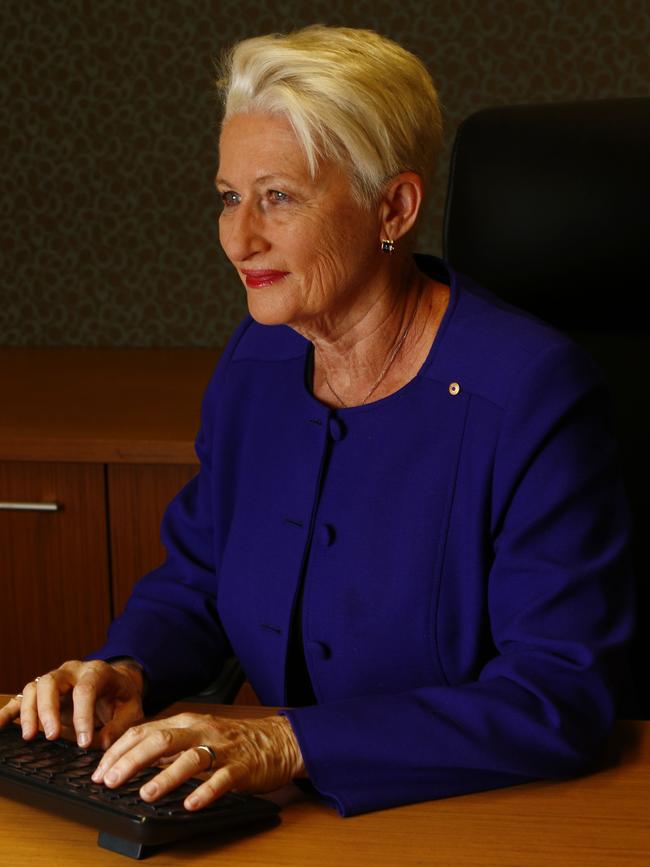
“There is an urgent medical crisis in Australia’s offshore detention centres,” she claimed, demanding we “follow the expert advice from Australian doctors” to treat “critically ill people”.
So, of the 184 “critically ill” detainees who have been evacuated under this legislation, how many are in hospital? Answer, none. Most are housed in taxpayer-funded rental accommodation, including hotel rooms and apartments. As of Monday, two-thirds of the 466 refugees and asylum-seekers housed offshore in PNG and Nauru had applied to be brought to Australia under Medivac.
READ MORE: Scott Morrison rebuffs claim of asylum deal | Tearful Jacqui Lambie secures Medivac repeal | Dennis Shanahan — Repeal of medivac laws was a vital victory for the Coalition |
Who can explain the incredible transformation of those seemingly on death’s door? I am reminded of the old joke about Murphy the con-artist who is wheeled out of court by his lawyer after being awarded millions of dollars for incapacitation despite a dodgy claim. “Listen Murphy,” says a furious insurance agent, “you may think you’ve won today but you’ll never enjoy those riches. I’m going to prove that wheelchair is a prop if it means I have to follow you for the rest of your days!”
Murphy is not fazed. “Then you’ll be following this wheelchair to Geneva, then Rome, then Paris, and then to the south of France,” he says cheerfully. “And believe me, when we go to Lourdes you are going to witness a miracle!”
On â¦@RNBreakfastâ© talking to â¦@hamishNewsâ© about #Medevac pic.twitter.com/avEITS8Hjm
— Prof Kerryn Phelps AM (@drkerrynphelps) December 2, 2019
Interviewed this week on Radio National by Hamish Macdonald, Phelps tried to rationalise the non-hospitalisation factor by claiming most of those evacuated were not suffering an acute condition. Instead, she said, they were complex ones best treated by an outpatient approach. Yet in late August the Department of Home Affairs confirmed that of the then 111 people evacuated to Australia, only four of them had spent time in hospital and a further 70 were not even outpatients.
When asked by MacDonald whether detainees were using Medivac for “strategic purposes,” Phelps was both unrepentant and in denial. “I believe it’s not,” she insisted. Pull the other one. Even the ABC reported upon the passing of the bill in February this year that detainees on Manus saw the legislation not just as a way of getting treatment, but also as a means of settling in Australia. “Everyone is waiting for a change in life, you will go to Australia and have a safe life,” said one detainee regarding Medivac.
As Home Affairs secretary Mike Pezzullo told Senate estimates, the “most grievous flaw in the legislation” was that detainees could be brought to Australia for assessment without proviso for their return to offshore detention. Additionally, 21 of those sent to Australia under Medivac had originally been intended for relocation to the US. This can only undermine Australia’s international third-country agreements.

As for Phelps’s claim Medivac would be for “critically ill” people, remember one of its beneficiaries is an Iranian man who was evacuated from PNG after botching a DIY penis enlargement. Named in nearly 50 incidents while in detention, he was arrested in 2013 for hurling boiling water at a security guard. In another case approval was given for a detainee who suffered receding gums, gingivitis and a urinary tract infection.
At the very least, Phelps could have acknowledged there were serious flaws in this legislation. Instead she expressed outrage at those who allegedly leaked patient information, saying it was intended to “discredit the Medivac system”. Tellingly, her reaction was not to admit the system had been gamed, but to take her anger out on those who exposed this process for what it is: the dog’s breakfast of private member’s bills.
Phelps’s brief elevation to Parliament had everything to do with an electorate miffed at the ousting of Malcolm Turnbull as prime minister, his refusal to endorse Liberal candidate and now Wentworth MP Dave Sharma, and the fact that governments rarely do well in by-elections. Somehow Phelps mistook all that as proof the nation was crying out for a moral saviour.
This is what I stand for: my First Speech in the Australian Parliament https://t.co/PPrFeFDKfj via @YouTube
— Prof Kerryn Phelps AM (@drkerrynphelps) December 11, 2018
Phelps’s Medivac debacle is exacerbated by her history with the Australian Medical Association, even though her tenure as federal president ended in 2003. Responding in June to Home Affairs minister Peter Dutton’s criticism of two doctors for recommending a detainee for evacuations without examining, interview or engaging with him, Phelps was fulminating. “To denigrate the motives and reputations of the doctors who are giving their time for a humanitarian cause is unconscionable,” she stated.
Similarly, when asked by Macdonald about whether Medivac as it has become was what she envisaged when she introduced the legislation, Phelps’s reaction was to bloviate and block. “I trust my colleagues who have been putting in place a very robust system to analyse the cases,” she said, adding they were “experts in their field”. Such a view ignores the reality that doctors can also be activists, leading in turn to their objectivity being compromised. Shortly before Phelps’ bill was passed, the paediatric head of the AMA, Dr Paul Bauert, made the disgusting claim that detainees on Manus and Nauru were even worse off than the Jews of Auschwitz, because the latter knew of their impending death and “found some sense of relief in knowing what was happening”.
The myth of medicos having purely disinterested motives extends even outside the profession. When ABC Fact Check this year examined immigration minister David Coleman’s objection that Medivac had a “very, very low threshold” for bringing asylum-seekers and refugees from Manus and Nauru to Australia, it concluded his claim was “spin”. In doing so, it cited, among others, the opinion of Macquarie University law professor Dr Daniel Ghezelbash, who observed: “To say or imply decisions will be made based on anything other than medical need is [an] insult to the medical profession and doctors everywhere.” Forgive my impertinence, but that is just is a huffy irrelevancy.
Primarily, Phelps was motivated by two factors, the first being the belief that the medical profession’s determinations regarding asylum seekers should subordinate all others, including that of government. As Paul Maley, The Australian’s national security editor, stated in February this year when condemning Medivac bill: “A doctor’s interest extends no further than his or her own patient. A minister’s interest is to the community, to the parliament and to asylum seekers as a whole. Doctors give no thought to consequences beyond those which affect their patients.” That is exactly what has occurred.

The second factor, closely linked to the first, was Phelps’ vision of the profession exercising influence outside its traditional domain. Her choice of words in the second reading of the bill is revelatory in this respect. Referring to the draft legislation’s requirement that two doctors would be able to recommend a detainee be transferred to Australia, she stated the bill would ensure “their orders are followed”. One must be highly qualified to practise medicine; unfortunately, a minority in the profession believes this knowledge makes one an expert in all walks of life.
Lastly, Phelps’s judgment was compromised by professional navel-gazing. During her maiden speech to Parliament she reflected: “A career in general practice grounds you in reality like no other profession possibly can.” Any police officers, prison guards, paramedics, nurses, and service personnel care to comment, particularly those members of the navy who had to retrieve the bodies of drowned asylum-seekers during the border protection debacle of 2008-13? In any event a multi-millionaire GP who charges $400 for an initial consultation is perhaps not best placed to pontificate about reality.
Phelps’s foray into asylum seeker policy, assisted by the connivance of Labor, the Greens and independents, has undermined the government’s offshore detention framework and resulted in the transfer to this country of many detainees who in fact were not suffering any condition other than “Australia or bust” syndrome.
So much for someone who proudly told the lower house “As a doctor, I was trained to examine evidence and to draw careful conclusions.”
In fact, the majority of voters last May examined evidence and drew their own careful conclusions regarding border policy — a very different view from that of Phelps. Undoubtedly she is an excellent doctor, but she proved utterly hopeless at taking the pulse of the nation.



Former independent MP Dr Kerryn Phelps’s Medivac bill was repealed yesterday, but its legacy will live on for many years. Before we explore that, just consider some of the statements she made during the bill’s second reading in December last year.